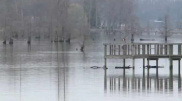America's Heartland Debates Keystone XL Pipeline
Around the heartland of America, thousands are participating in a national conversation about the Keystone XL Pipeline.
The State Department has set public meetings in Kansas, Montana, Nebraska, Oklahoma, Texas and South Dakota this week for citizens to contribute their opinions before deciding the fate of TransCanada's controversial oil pipeline.
Meetings have already occurred in Kansas, Nebraska and Texas, revealing key themes as well as special regional considerations regarding the pipeline's potential effects.
Nebraska's water
The Nebraska meeting became one of the more heated battlegrounds as the pipeline is set to cross a critical water source for the state -- the Ogallala Aquifer.
Critics maintain the close proximity is a disaster waiting to happen. At his state's meeting on Sept. 27, Nebraska Sen. Ken Harr (Dem.) told State Department officials the government didn't "give a damn" about the welfare of his constituents.
"We are in a fight for our water," he said, according to the Wall Street Journal.
However, as stated in its environmental review released last month, the State Department maintained there will be "no signifiant impacts" to the water sources surrounding the pipeline.
Labor unionists traveled from nearby states to contribute their approval of not only the pipeline's construction, but of the oil company's reputation.
"They believe in building it right, as we do. You build it right, or you don't build it at all," said David Barnett, spokesman for Pipeliners Union Local 798 in Oklahoma, according to the Montreal Gazette.
The jobs dilemma
In the three public meetings held so far, another theme of the debate revolved around a familiar topic in the nation's current economic climate: job creation. TransCanada officials claim operations relating to the $7 billion Keystone XL pipeline will create 20,000 new jobs.
KSNT reported Kansas union members said the promise of more jobs is too good to pass up.
"It's what the county needs...A lot of people unemployed right now could be working," said Don Chance, a member of Pipeliners Union 101.
"This is what we've done all our lives, we bring the oil to these refineries. Let 'em work. That's what we need right now is work," said Buddy Frank of Pipeliners Union 798 in southeast Texas.
And in Nebraska, some felt the pangs of unemployment to be too severe for any debate at all.
"Our family is quite appalled that this has become even an issue, at a time when there is a need for so many jobs. It seems nonsensical to even be arguing this issue," said Patrick Bonnett, an Omaha resident.
Environmental concerns
Although supporters of the pipeline often outnumbered the critics, the voice of the opposition was still made known -- especially in concern for the environment.
In Texas, some doubted the overall safety of the pipeline's construction. Kat Herrera of the Sierra Club acknowledged the need for employment, but questioned the method.
"It is important to focus on jobs, but also the economic damage that may and probably will come from this. The American worker needs more than a temporary, dirty job," she said.
Regardless of the safety of the project, environmentalists are concerned the pipeline will increase the nation's reliance on fossil fuels. Rabbi Moti Rieber, Director of Kansas Interfaith Power & Light, questioned the logic of building infrastructure for non-renewable energy.
"We know that we need to stop putting more carbon into the environment, yet here we are finding new ways to put more carbon into the environment and we need to say 'no'."
Meetings in Montana, Oklahoma and South Dakota are set for later this week.





